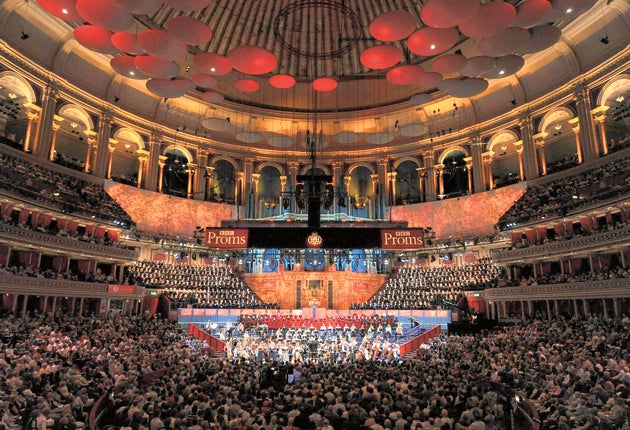First Night: First Night of the Proms, Royal Albert Hall, London
Season opens with a bang big enough to blow the roof off

Whilst the First Night of the Proms traditionally has nothing of the glory – nor the pomp, circumstance or notoriety – of the Last Night, it nevertheless marks an important moment in Britain's musical calendar.
This year, Roger Wright, director of the 58-day festival, chose to start his third season in charge with a bang. Gustav Mahler's triumphant Eighth Symphony, appropriately nicknamed Symphony of a Thousand by its original promoter exactly 100 years ago (in fact, there were 1,029 performers on stage at that first concert) is one of the greatest and grandest music works ever created. Requiring two huge mixed choirs; a large children's choir; eight vocal soloists; an organ, celesta, grand piano and harmonium onstage; a brass choir offstage; and, of course, a gigantic symphony orchestra, there is simply nothing in music quite like it.
The sense of expectation among Prommers queueing outside was palpable. It was nothing, however, to that inside the hall, where there was not an empty seat to be seen and the atmosphere went from heady to electrified over the course of 90 epic minutes.
Mahler, who was born 150 years ago, allegedly completed his magnum opus in a flurry of epiphanic inspiration over eight weeks of the summer of 1906. Afterwards, he wrote: "The Spiritus Creator took hold of me and shook me and drove me on... until my greatest work was done."
That miraculous moment did more than just generate a masterpiece; the idea of a relationship between man and creator spirit underpins, philosophically, the entire work. Composed of just two movements, the first part sets the ancient Latin hymn "Veni", creator spiritus, while the second sets 220 lines of the final scene of Goethe's Faust. Though separated by centuries, each text is ultimately concerned with the celebration and affirmation of grace; Mahler unites both, astonishingly, through his music.
Under the invigorating baton of their chief conductor Jirí Belohlávek, the BBC Symphony Orchestra – which gave the British premiere of this symphony at a Prom conducted by Henry Wood in 1930 – has rarely been better; the woodwind and an enormous, Mahlerian brass section in particular. Leader Andrew Haveron was also impressive, both in his command of the entire ensemble and in his numerous solo passages, in which he showed off a glorious tone and superb musicianship. Meanwhile the principal oboist, Richard Simpson, and principal cellist, Susan Monks, also shone in solo passages that accompanied the singers to perfection.
And whilst the vocal soloists were terrific, especially tenor Stefan Vinke who stepped in this week to replace the ailing Nikolai Schukoff, the real stars were the amassed choruses; the hundreds (if not, on this occasion, thousands) of members of the BBC Symphony Chorus, Crouch End Festival Chorus, Sydney Philharmonia Choirs, and the choristers of St Paul's and Westminster Cathedrals and Westminster Abbey. Their grasp of the text, control of dynamic range and sheer exuberance at times blew the roof off that great hall. Such were the moments of immensity, such were the breathtaking silences, that Mahler's suggestion: "Imagine that the universe begins to ring and resound..." was unnecessary. We didn't have to imagine; we were living it.
Staging Mahler's Eighth is a monumental feat in itself. That it is a mere prelude to the two other towering vocal-orchestral works coming up this weekend at the Proms (today, Bryn Terfel sings Hans Sachs in a six-hour marathon of Wagner's Die Meistersingers; tomorrow, Placido Domingo takes the title role in Verdi's Simon Boccanegra) leaves one turning to Goethe's text in awe.
As the final scene of Faust draws to its celestial close, Goethe writes: "Here the indescribable is accomplished". If Prom No. 1 is any indicator of the joys in store for the rest of the season, Roger Wright has already managed exactly that.
Join our commenting forum
Join thought-provoking conversations, follow other Independent readers and see their replies
Comments
Bookmark popover
Removed from bookmarks